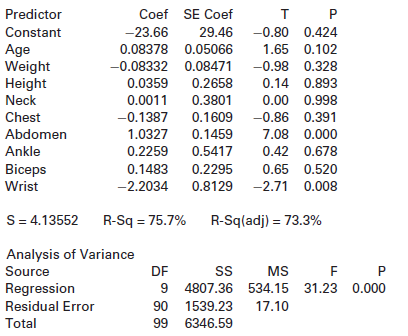Question: Data 10.1 on page 562 introduces the dataset BodyFat. Computer output is shown for using this sample to create a multiple regression model to predict
Data 10.1 on page 562 introduces the dataset BodyFat. Computer output is shown for using this sample to create a multiple regression model to predict percent body fat using the other nine variables.
The regression equation is Bodyfat = ˆ’ 23.7 + 0.0838 Age ˆ’ 0.0833 Weight + 0.036 Height + 0.001 Neck ˆ’ 0.139 Chest + 1.03 Abdomen + 0.226 Ankle + 0.148 Biceps ˆ’ 2.20 Wrist

(a) Interpret the coefficients of Age and Abdomen in context. Age is measured in years and Abdomen is abdomen circumference in centimeters.
(b) Use the p-value from the ANOVA test to determine whether the model is effective.
(c) Interpret R2 in context.
(d) Which explanatory variable is most significant in the model? Which is least significant?
(e) Which variables are significant at a 5% level?
Data 10.1 on page 562
The percentage of a person€™s weight that is made up of body fat is often used as an indicator of health and fitness. However, accurate methods of measuring percent body fat are difficult to implement. One method involves immersing the body in water to estimate its density and then applying a formula to estimate percent body fat. An alternative is to develop a model for percent body fat that is based on body characteristics such as height and weight that are easy to measure. The dataset BodyFat contains such measurements for a sample of 100 men.1 For each subject we have the percent body fat (Bodyfat) measured by the water immersion method, Age, Weight (in pounds), Height (in inches), and circumference (in cm) measurements for the Neck, Chest, Abdomen, Ankle, Biceps, and Wrist .
Predictor Coef SE Coef -23.66 29.46 -0.80 0.424 Constant Age Weight Height 0.08378 0.05066 1.65 0.102 -0.08332 0.08471 -0.98 0.328 0.0359 0.2658 0.14 0.893 Neck 0.0011 0.3801 0.00 0.998 Chest 0.1609 -0.1387 -0.86 0.391 Abdomen 1.0327 0.1459 7.08 0.000 0.5417 Ankle 0.2259 0.42 0.678 0.2295 0.8129 Biceps 0.1483 0.65 0.520 -2.71 0.008 Wrist -2.2034 S= 4.13552 R-Sq = 75.7% R-Sq(adj) = 73.3% Analysis of Variance Source DF MS 9 4807.36 534.15 31.23 0.000 Regression Residual Error 90 1539.23 17.10 Total 99 6346.59
Step by Step Solution
3.39 Rating (158 Votes )
There are 3 Steps involved in it
a The coefficient of Age is 008378 All else being equal a person one year older wil... View full answer

Get step-by-step solutions from verified subject matter experts


